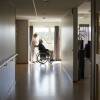Shanna LaFountain has been a nursing assistant for 20 years, but about two months ago, in the middle of the coronavirus pandemic, she stopped working.
“I feel guilty. It eats me away,” she said. “It was an extremely hard decision to make.”
LaFountain, who has three children, said she made the decision once her children's schools closed.
“The school was calling and emailing me constantly. My son was not answering teachers, not doing assignments. It was just too much. I had to be home with my children,” she said.
Instead of working, she gets unemployment benefits, and she receives $600 extra per week from the federal government on top of typical state unemployment benefits. She is making more now than when she works.
LaFountain is not alone. As part of the CARES Act, which President Trump signed into law March 27, the federal government added an extra $600 per week to individuals’ unemployment checks. In some industries, that means many people make more by collecting unemployment than they would by working, and some worry that is incentivizing workers to stay home.
Experts say nursing homes and long-term care facilities — which account for 60 percent of COVID-19 deaths in the state — are among the industries most critically affected by this phenomenon in Massachusetts. Many certified nursing assistants like LaFountain, who would make more money staying home, say the rates for their work don’t match the risks.
Partially as a result, as these facilities are battling the novel coronavirus, they are also grappling with understaffing. Some staff are required to quarantine after being exposed to the virus, others are going to neighboring states where they can make higher wages, and still others are staying home and collecting unemployment. The understaffing makes it particularly harder for nursing homes and long-term care facilities to implement the protocol necessary to prevent the spread of the virus.
“[I’ve] been doing this for 34 years, the last three months have been the most difficult in my career,” said Micha Shalev, who co-owns Dodge Park and Oasis at Dodge Park, two facilities in Worcester that specialize in dementia care.
Shalev said it’s been a lot of work to keep the residents in his facilities safe from the virus — no resident in either has tested positive. While his facility and others have been taking extra precautions, he said they’re doing it with far less staff than they need.
In large part, he argues, that’s because of those generous unemployment checks.
“It’s insane, and it’s taking a big toll on many organizations that are open and looking for workers,” he said. “I'm not against paying people for their unemployment or those people that lost a job. But in order to do justice, they should be paying all the frontline workers in healthcare at least the same, if not even more.”
Shalev said his facility has not been as hard hit by the worker shortage as some nursing homes, partly because they’ve been giving bonuses during the pandemic, and they offer employees retirement benefits and free meals. But that’s not sustainable or realistic for all facilities, he said, especially as the industry faces major financial challenges.
Shalev thinks the best solution is for the government to supplement the wages of nurses and nursing assistants.
“You can achieve a couple things: You can help the unemployment. You can help the facility. And then, you can provide a decent wage, so everybody wants to come to work in the healthcare industry because, right now, nobody wants to come to work,” he said.
Many facilities are trying to survive by turning to staffing agencies, which have a pool of nurses and certified nursing assistants (CNAs) to help fill empty shifts. But those agencies are having trouble meeting the demand.
David Coppins, who runs the temporary nursing agency IntelyCare, said roughly 35 percent of the agency’s CNAs are on the sidelines — taking unemployment — during the pandemic. That’s true even as CNAs make more during the pandemic than usual.
Prior to the pandemic, CNAs who worked full-time at a facility in Massachusetts made about $15 an hour, but during the COVID-19 crisis the average has jumped to $25 an hour, said Coppins. However, by collecting unemployment as well as the CARES Act supplement from the federal government, Coppins said Massachusetts CNAs who stay at home can make about $31 an hour.
“I know why the federal government went through and made a quick change on this, but I don't think anybody understood that it would actually devastate the workforce that they never wanted to devastate,” Coppins said. “Not only are they essential workers, they're, like, critical workers.”
In a typical nursing home, he said, about two-thirds of the workforce are CNAs.
They are often the ones with the closest relationship with patients, who can recognize early signs of health problems in residents and are well-versed in infection control procedures.
“Without them, you've got administrators, cafeteria workers, you've got all sorts of nurses performing the CNA duties. And then you just have people that aren't getting attention because there's just not enough people working right now,” he said.
Congress is currently debating whether to extend the federal program. For now, the extra money is slated to stop at the end of July.






